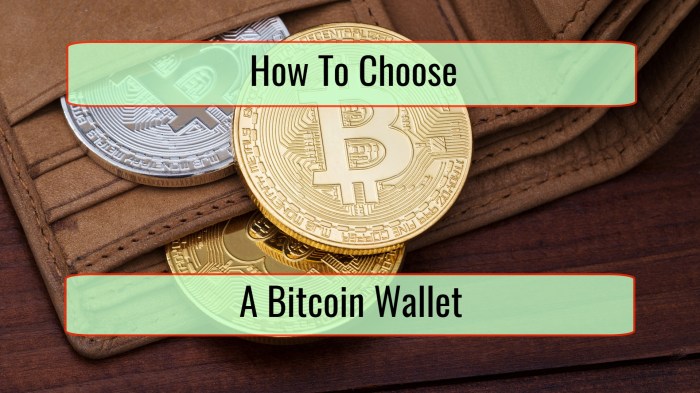Bitcoin wallets set the stage for this enthralling narrative, offering readers a glimpse into a story that is rich in detail and brimming with originality. From the various types of wallets to security measures and managing transactions, this guide has got you covered.
Get ready to dive into the world of Bitcoin wallets and discover everything you need to know to keep your cryptocurrency safe and secure.
Types of Bitcoin Wallets
When it comes to storing your precious Bitcoins, there are a few different options available to choose from. Let’s take a look at the various types of Bitcoin wallets and see how they stack up against each other.
Hardware Wallets
Hardware wallets are physical devices designed to securely store your Bitcoins offline. They are considered one of the most secure options as they are immune to hacking attacks that can target software wallets. However, they can be a bit pricey compared to other types of wallets.
Software Wallets
Software wallets are digital applications or online platforms that allow you to store and manage your Bitcoins. They are convenient and easy to use, but they are more vulnerable to cyber attacks compared to hardware wallets. It’s crucial to choose a reputable software wallet to ensure the safety of your funds.
Paper Wallets
Paper wallets are a form of cold storage where you print out your Bitcoin public and private keys on a piece of paper. They are highly secure as they are not connected to the internet, making them immune to hacking attempts. However, they can be easily lost, damaged, or stolen if not stored properly.
In conclusion, hardware wallets offer the highest level of security but come at a higher cost. Software wallets are convenient but more susceptible to cyber threats. Paper wallets provide excellent security, but they require extra precautions to prevent loss or damage. Choose the type of Bitcoin wallet that best fits your needs and prioritize the safety of your digital assets.
Security Measures for Bitcoin Wallets

When it comes to securing your Bitcoin wallet, you gotta be on top of your game. With cyber threats lurking everywhere, it’s crucial to take the necessary precautions to protect your hard-earned crypto assets.
To start off, let’s talk about the importance of private keys and seed phrases. Your private key is like the key to your safe deposit box – keep it safe and never share it with anyone. Your seed phrase, on the other hand, is like the master key to all your crypto holdings. Make sure to store it in a secure place, preferably offline, and never expose it to prying eyes.
Best Practices for Securing Your Bitcoin Wallet
Always use a secure and reputable wallet.
Enable two-factor authentication for an extra layer of security.
Regularly update your wallet software to patch any vulnerabilities.
Avoid using public Wi-Fi networks for transactions.
Consider using a hardware wallet for added security.
Protecting Against Hacking and Phishing Attacks, Bitcoin wallets
Be wary of phishing emails and websites asking for your wallet information.
Double-check URLs and always verify the authenticity of websites before entering sensitive data.
Avoid clicking on suspicious links or downloading attachments from unknown sources.
Keep your antivirus software up to date to prevent malware attacks.
Never disclose your private key or seed phrase to anyone, no matter what.
Setting Up a Bitcoin Wallet: Bitcoin Wallets

When it comes to setting up a Bitcoin wallet, it’s crucial to follow a step-by-step process to ensure the security of your digital assets. Choosing a reputable wallet provider is key to safeguarding your funds and personal information. Additionally, generating a new wallet address and backing up essential data are important steps to protect your investment.
Choose a Reputable Wallet Provider
Before setting up your Bitcoin wallet, take the time to research and select a reputable wallet provider. Look for a provider with a track record of security and user-friendly interface. Make sure to read reviews and gather information about the wallet’s features to make an informed decision.
Generate a New Wallet Address and Backup Data
Once you’ve chosen a wallet provider, the next step is to generate a new wallet address. This address serves as your unique identifier on the blockchain and is essential for sending and receiving Bitcoin. Make sure to follow the instructions provided by your wallet provider to generate a secure address.
It’s also crucial to backup important data related to your wallet, such as private keys and recovery phrases. Store this information in a secure location, preferably offline, to prevent unauthorized access. Remember, losing access to your wallet data could result in losing your Bitcoin holdings permanently.
Managing Transactions with Bitcoin Wallets
Bitcoin transactions are initiated by the sender using their Bitcoin wallet to create a transaction. This transaction includes the recipient’s address, the amount of Bitcoin being sent, and a small fee. Once the transaction is created, it is broadcasted to the Bitcoin network to be confirmed.
Transaction Confirmation and Fees
- Transaction fees play a crucial role in the speed of transaction confirmations. Miners prioritize transactions with higher fees, so including a higher fee can result in a faster confirmation time.
- When a transaction is confirmed, it means that the network has validated the transaction as legitimate and added it to a block on the blockchain. This process ensures that the Bitcoin being sent is not double-spent.
- Transaction fees are typically based on the size of the transaction in bytes, not the amount being sent. This means that larger transactions may require higher fees to be processed quickly.
Tracking Transaction History
- Bitcoin wallets allow users to track the history of their transactions within the wallet interface. Users can see the date, time, amount, and status of each transaction.
- By checking the transaction history, users can verify that their transactions have been successfully sent and received. This helps in ensuring the accuracy of their Bitcoin balance.
- Wallets may also provide additional details such as transaction IDs, which can be used to look up specific transactions on the blockchain explorer.


